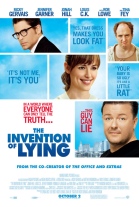The Invention of Lying
|  The Invention of Lying, which marks the feature co-directorial debut of British comedic actor Ricky Gervais, is a terribly unwieldy vehicle built on an inherently funny premise that just can’t sustain what Gervais and co-writer/co-director Matthew Robinson eventually want to heap on it. The story takes place in a world that looks exactly like our own except for the fact that no one lies. In fact, the very concept of lying literally does not exist, so everyone speaks his or her mind without any elaborating, obscuring, hedging, or otherwise fudging, much less outright making something up. This results in exchanges between people that are brutal and ruthless in their candor, which constantly reminds us of just how much the truth can hurt. The Invention of Lying, which marks the feature co-directorial debut of British comedic actor Ricky Gervais, is a terribly unwieldy vehicle built on an inherently funny premise that just can’t sustain what Gervais and co-writer/co-director Matthew Robinson eventually want to heap on it. The story takes place in a world that looks exactly like our own except for the fact that no one lies. In fact, the very concept of lying literally does not exist, so everyone speaks his or her mind without any elaborating, obscuring, hedging, or otherwise fudging, much less outright making something up. This results in exchanges between people that are brutal and ruthless in their candor, which constantly reminds us of just how much the truth can hurt.We get our first taste of this when the film’s hero, a meek but likable schlub named Mark Bellison (Gervais) who works as a screenwriter (which sounds exciting until you realize that, in a world with no fabrication, movies are just bland documentaries of people reading from fact-based accounts of history), goes on a date with Anna McDoogles (Jennifer Garner), a woman for whom he has been pining for some time. Early in the date Anna informs Mark with forthright bluntness that this will likely be their only date because she doesn’t like his weight or his nose and is therefore not a good genetic match for her. Mark seems to be the only person in the world who is generally unhappy with these all-the-truth-all-the-time interactions, even if he can’t put his finger on why since he can’t imagine an alternative. It may also be because his life is spiraling downhill, a fact that everyone around him, especially his secretary (Tina Fey) and a rival screenwriter named Brad Kessler (Rob Lowe), never fail to mention. And then one day, while withdrawing his last $300 from the bank to pay his rent, Mark does something that no one else has ever done before: He says something that isn’t. And it works. And because no one else can even conceive of the concept of fibbing, whenever he tells a lie or makes something up or stretches the truth, the people around him accept it with absolute conviction, whether it be his best friend Greg (comedian Louis C.K.) believing that he invented the bicycle or a random woman on the street who never doubts that the world will, in fact, end if they don’t have sex. Although his conscience ultimately gets the better of him in the end-of-the-world sex scenario, Mark quickly realizes the vast potentials that come with not being beholden to the truth, and he uses them to enrich himself by writing a whopper of a screenplay that everyone accepts as fact because, after all, what else could it be? At this point, The Invention of Lying is a relatively sharp comedy that does an excellent job of drawing our attention to the nature of everyday communication and how so much of it is cushioned with little lies and mistruths that simply make life easier. The concept is somewhat muddled, however, in how Gervais and Robinson conceive of the nature of truth-telling in their imaginary world, since people not only tell the unvarnished facts, but also offer it constantly without invitation. That is, people aren’t so much unable to lie as they are simply compelled to spill whatever they’re thinking at any given moment, which I suppose is an element of truth-telling since withholding information is essentially lying by omission. But, does Anna really need to announce to Mark when she first opens the door for their date that she has just been masturbating? Probably not, but it does make for a great opening gag. Unfortunately, about midway through the film the story takes a sharp left turn when Mark is overhead by a doctor and several nurses soothing his mother on her deathbed by telling her that there is a wonderful afterlife, which immediately elevates Mark to the level of cosmic guru. Everyone in the world comes to believe that he has a direct pipeline to the unknown, and once trapped in this corner, he finds himself playing the combined roles of Moses, Mohammad, John the Baptist, and Jesus in quickly piecing together the concept of religion (that is, human understanding of that which escapes human understanding) to satiate the public’s intense desire to “know.” As Mark’s actions naturally align religious belief with outright fabrication, The Invention of Lying morphs from a witty social satire of our need to pad our lives with convenient lies to a scathing religious satire aimed at anyone who believes in something he or she can’t scientifically prove (which isn’t surprising given that Gervais is a prominent atheist). The problem is that, the way Gervais and Robinson condescendingly present it, religion is accepted only by those who don’t know better (i.e., the film’s population of people who are incapable of recognizing a lie), which essentially dehumanizes the process by which many people have faith. This is tricky and potentially ugly ground to tread, and Gervais and Robinson don’t do it very well, squandering much of Mark’s likability in his newfound role as awkwardly self-proclaimed religious prophet and then attempting to patch everything up with a conventional romantic ending that finds Anna realizing that her “perfect genetic match” may not be the key to lifelong happiness. By then the film has bogged down so much in simple mockery that it’s hard to feel good for anyone, however much Gervais wants you to. Copyright ©2009 James Kendrick Thoughts? E-mail James Kendrick All images copyright © Warner Bros. |
Overall Rating: 
 (2)
(2)


